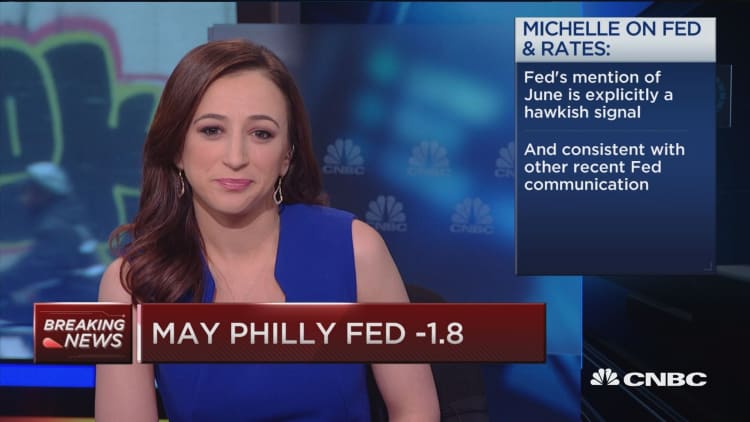
If the Fed is going to raise rates in June, it will have to get clearance from what has become its most important constituency: the market.
The early returns have not been good. Stocks sold off sharply Wednesday afternoon following the release of a summary from the April Fed meeting, and the market followed that up Thursday with another sharp drop.
Over the course of its history, the U.S. central bank has a long record of not wanting to surprise investors. On the few occasions that did happen, like 1994, the results were not good. In recent years, the Fed largely has followed market dictates when it comes to raising and lowering rates.
With the memories of what happened after the December 2015 hike fresh in their minds, Federal Open Market Committee members then aren't likely to move unless the market is ready.
However, according to one Fed watcher's interpretation, the FOMC is feeling a little less cowed by Wall Street sentiment.
David Blitzer, managing director and chairman of the Index Committee at S&P Dow Jones Indices, believes the minutes from the latest FOMC meeting show a Fed less concerned about market reaction.
"It would take a lot to scare them between now and June to make them say they won't raise rates at all because of some turmoil in the financial markets," Blitzer said in an interview.
He pointed to one specific section of the minutes that read:
Most participants judged that the benefits of using monetary policy to address threats to financial stability would typically be outweighed by the costs associated with deviations from the Committee's employment and price-stability objectives induced by such actions; some also noted that the benefits are highly uncertain.
The implication would be that if the Fed kept holding off on raising rates simply because of market reaction, that could undermine its credibility, which hinges on addressing its dual mandate of full employment and price stability.
Following the release of the minutes, the market adjusted its rate expectations. Just before the Wednesday afternoon release, traders had assigned virtually no chance of a June move. As of midday Thursday, the probability went to 26 percent, though that was down from 34 percent the day before.
The calculus will be delicate: Both sides will have to get on the same page regarding economic growth, which has been uneven. If Fed speakers between now and the June meeting can make the case that the economy can handle another quarter-point hike, then the market reaction might not be so bad. If not, things could get ugly.
"Until very recently, the market's view of the economy was a lot weaker and a lot softer than the Fed's. The market may be frustrated," Blitzer said. "Part of what we see is then market is slowly revising its view to be close to the Fed."
The first two Fed speakers after Wednesday's release offered only measured guidance. New York Fed President Bill Dudley reiterated the notion that the Fed will hike rates if the data comply, hardly an earth-shaking sentiment, though he did add that he was happy market expectations had adjusted to at least the possibility of a summer move.
Fed Vice Chair Stanley Fischer earlier in the day steered clear of prognostication, opining only that the economy needs faster growth.
Amid it all, the market remained unconvinced the Fed will move, and that could be the biggest vote of all. After all, the 26 percent chance of a rate hike the market assigned to June, while substantially higher than in recent weeks, still indicates a 74 percent chance that the Fed won't hike.
"The Fed continues to prove their adeptness of getting market participants to continue to run from one side of the boat to the other," Brett F. Ewing, chief market strategist at First Franklin Financial, and S. Lance Mitchell, the firm's research director, said in a note.
"We continue to believe there is little to no chance of a rate hike in June and that the Fed minutes are akin to knowing you're being recorded and the need to say something one half the people will agree with while actually doing the thing with which the other half agrees."




